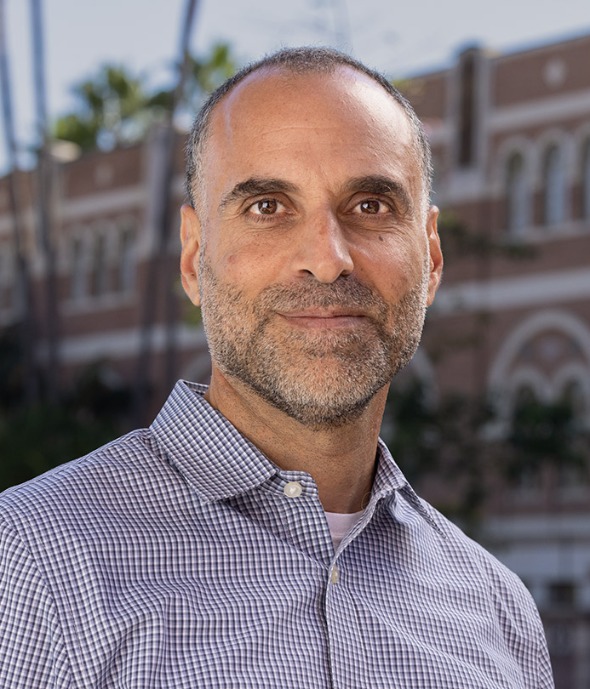
Quoted: Hovig Tchalian in AP News
Tchalian explains that automakers may be able to adjust to high tariffs because of their experience with COVID-19 supply chain disruption.
Hovig studies how the social conversation around new technologies impacts how and whether markets emerge around them.
When Amazon first launched, no one was familiar with e-commerce. So Amazon and similar companies started using the language of in-person shopping ("browsing," "shopping carts," and "checkout") to make the process more familiar for people. That translation of the unfamiliar into the familiar had a lot to do with the success of e-commerce. With new technologies launching on almost a daily basis, these and similar approaches to market emergence matter even more today. And doing so successfully is even more challenging in specialty contexts like high-end coffee and premium whiskey that focus on authenticity and status.
In academic language, Hovig's research focuses on nascent and specialty contexts, where the socio-cultural meaning of markets is especially prominent.In particular, Hovig studies the strategic categorization efforts of auto manufacturers launching into the slow-growth Electric Vehicle (EV) category. He also has a few ongoing studies on the impact of digital technologies on exchange in upscale handicrafts.
Hovig has also developed computational methods for studying large-scale emergence, including a well-cited paper with co-authors on using topic modeling to render theory.

Areas of Expertise
Programs
Departments
Centers + Institutes
INSIGHT + ANALYSIS
Quoted: Hovig Tchalian in AP News
Tchalian explains that automakers may be able to adjust to high tariffs because of their experience with COVID-19 supply chain disruption.
Quoted: Hovig Tchalian in PBS News
Tchalian says that while uncertainty remains high concerning new tariffs, automakers have some experience from Covid-19’s supply chain disruption.
OpEd: Hovig Tchalian in The Conversation
Based on his research, TCHALIAN writes in The Conversation that EVs are an old new technology, but its widespread adoption has had a long road affected by technical, economic, and social factors.
NEWS + EVENTS
Connections and Career Pivots: A Q&A with Alice Zhou on the Marshall MBA Experience
Supported by the MBA program and Trojan Network, Alice Zhou is making a career pivot into consulting at McKinsey.
Trojan Basketball Star Kiki Iriafen Pursues Entrepreneurship at Marshall
Before Trojan forward Kiki Iriafen heads to the WNBA, she is back in her hometown of Los Angeles to get her master’s degree in Entrepreneurship at USC Marshall.
Marshall Faculty Publications, Awards, and Honors: August 2024
We are proud to recognize the many accomplishments of Marshall’s exceptional faculty, including recently accepted and published research and achievements in their field.
Cutting-Edge Research Exhibited at Marshall Fair
From craft whiskey to financial crime, the Marshall Research Fair showcased groundbreaking studies in multiple subjects.
2024 USC Marshall Research Fair
Scholars present their latest research on the impacts of new technology — February 23rd from 11:30 a.m.–2:00 p.m. in the Ronald Tutor Center Grand Ballroom.
A Q&A with Hovig Tchalian on Electric Vehicles, China, and Popular EV Myths
Professor Tchalian offered his thoughts on the state of EVs in the United States and around the world.
Marshall Hires 18 Faculty Members
RESEARCH + PUBLICATIONS
This chapter argues that the primary reason for the underdeveloped state of microfoundations research in language and communications studies is methodological. It asserts that the long-standing methodological division between micro and macro analyses (traditionally small-scale and large-scale, respectively) has led to their continued theoretical separation. The paper draws from Giddens’ theory of structuration and newly developed computational methods to outline an alternative, mixed-methods framework for dis- course analysis that the author calls Recursive Analysis (RA). The author demonstrates the application of the RA framework through a case study of the electric vehicle industry that aligns small-scale and large-scale textual analysis to generate theoretical insights.
Increasingly, management researchers are using topic modeling, a new method borrowed from computer science, to reveal phenomenon-based constructs and grounded conceptual relationships in textual data. By conceptualizing topic modeling as the process of rendering constructs and conceptual relationships from textual data, we demonstrate how this new method can advance management scholarship without turning topic modeling into a black box of complex computer-driven algorithms. We begin by comparing features of topic modeling to related techniques (content analysis, grounded theorizing, and natural language processing). We then walk through the steps of rendering with topic modeling and apply rendering to management articles that draw on topic modeling. Doing so enables us to identify and discuss how topic modeling has advanced management theory in five areas: detecting novelty and emergence, developing inductive classification systems, understanding online audiences and products, analyzing frames and social movements, and understanding cultural dynamics. We conclude with a review of new topic modeling trends and revisit the role of researcher interpretation in a world of computer-driven textual analysis.
COURSES